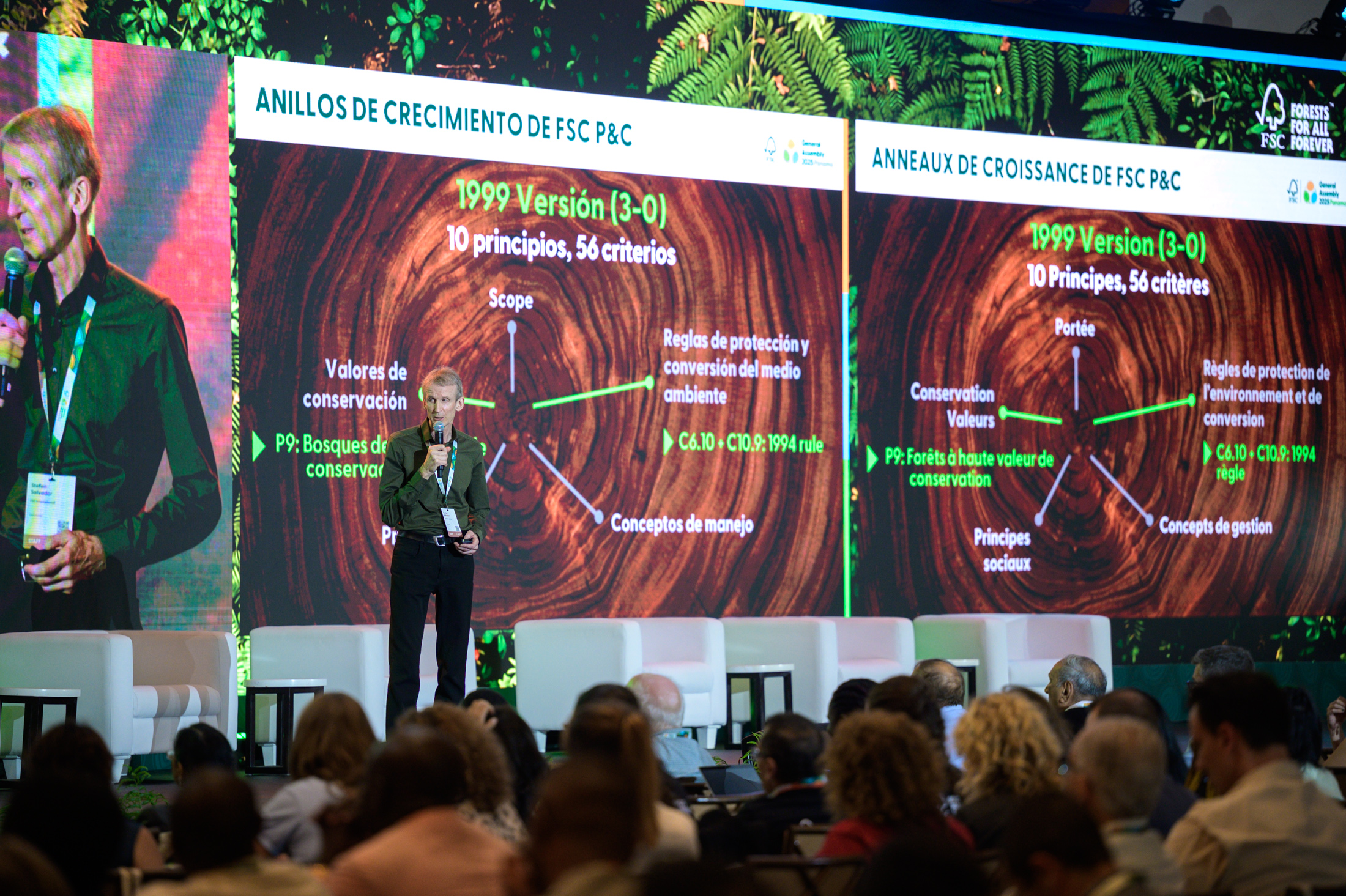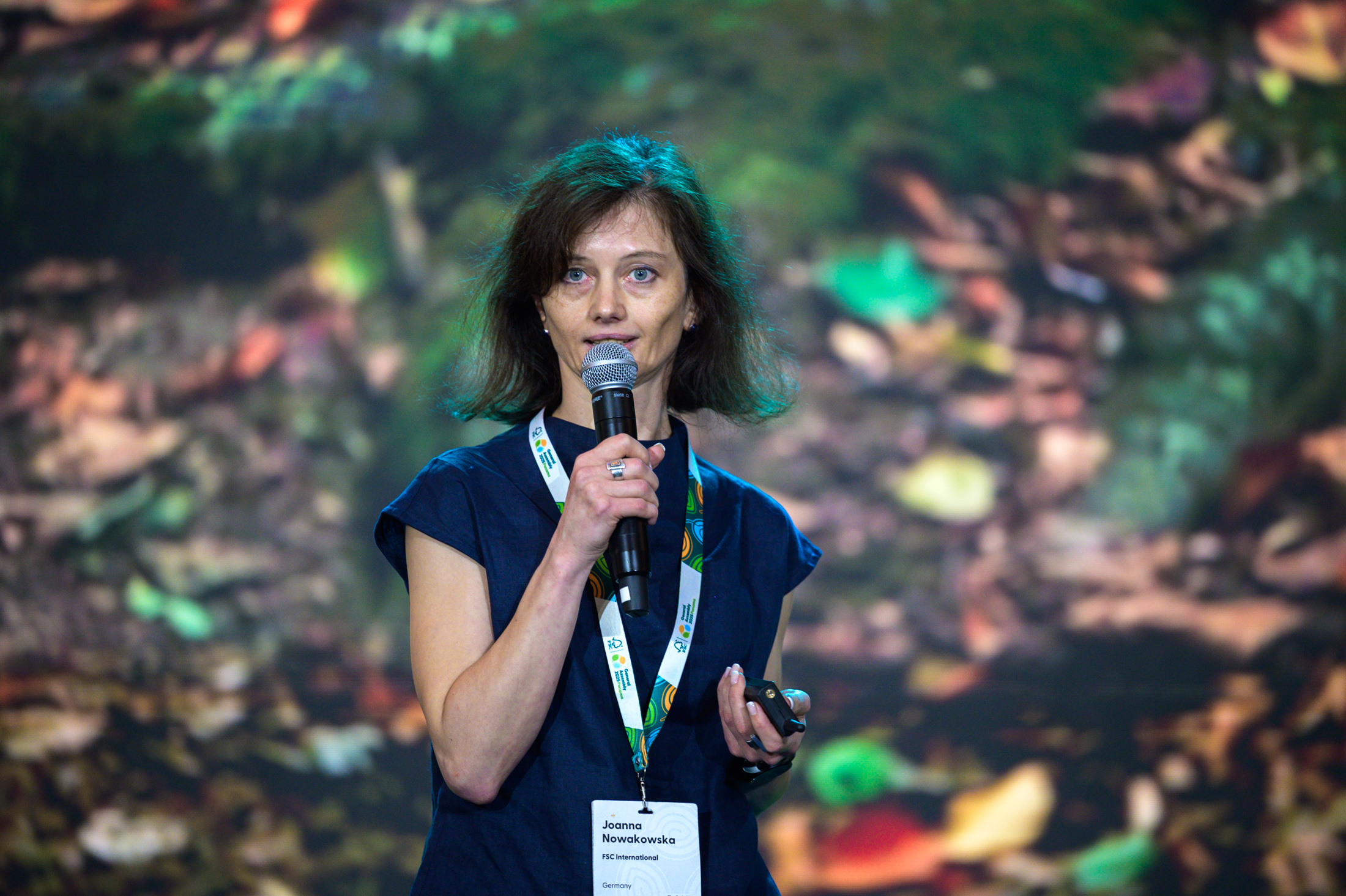As FSC engages in a public consultation on the revision of the Principles & Criteria, the plenary explored the questions: How can we balance stability with transformation? What would outcome-oriented standards look like in practice? How do we embed climate action, clarity, and usability into the next chapter of FSC?
FSC Director General Subhra Bhattacharjee opened the session by highlighting 30 years of achievements, the credibility FSC has built, and the need to evolve for future. “This cannot be a business-as-usual process. We have to dig deep, figure out new ways to work, and be up front about the pains that establishing deep-down roots involve,” Subhra said.

The evolution of FSC’s Principles & Criteria
FSC’s Principles & Criteria have evolved since their creation in 1994. Stefan Salvador, FSC Policy Director, reflected on this evolution and role of the Principles & Criteria in building trust and defining forest stewardship. He highlighted the new concepts included such as high conservation values, gender equality, and Indigenous Peoples’ rights. Yet, some fundamentals have remained constant: they are grounded in balanced environmental, social, and economic perspectives and are globally relevant while adaptable to local contexts.
Taking a walk through the forest
Joanna Nowakowska, Policy and Performance Director, took the audience through a walk in the forest because, as she put it: “A mature and healthy forest, a resilient one, is an excellent metaphor for a community.” While the world is changing rapidly due to the climate and biodiversity crises, FSC needs to find new ways for forest management to keep up with these changes. But through collaboration among the FSC community, we can turn those challenges into opportunities, and the Principles and Criteria, as our structural values, are the way to do this.
The future of FSC’s standards
A panel discussed what success in forest certification would look like in 2035.
Kevin Jones, Economic North representative on the Policy and Standards Committee, highlighted how forest evaluation has shifted in 30 years to be more thorough and more complex, both in accreditation requirements for certification bodies and the requirements for forest managers. Regarding language, he suggested fewer and simpler words to connect these kinds of discussions with the reality in the forest.
Glenda Lee, Engineer in Natural Renewable Resources and advisor to several companies in Guatemala, shared the real-world challenges producers face in applying certification standards on the ground and the need to calibrate better.
“The next generation of FSC’s Principles and Criteria should keep the same strong foundation, but be simpler to apply, a tool that helps everyone, from auditors to forest managers, achieve real impact,” Glenda said.
Next, Rod Taylor, Global Director of Forests and Nature Conservation at the World Resources Institute, spoke about the transformative role of science and data in global forest governance. For example, there has been a surge in the last year in the ability to do earth monitoring, and this is a great opportunity for FSC. “I think if we have the precision, the accuracy, and the transparency of that data, we'll create a race to the top,” he said.
Prudence Galega, FSC Africa Committee Member and biodiversity negotiator from Cameroon, noted the growing international recognition of forests as central to addressing climate change, biodiversity loss, and sustainable development. She called on FSC and its members to align their Principles & Criteria this trend while safeguarding community rights and building capacity among forest managers to adapt to climate impacts.
Can certification stand up to climate change?
The audience shared ideas and reflections on this question, including the importance of working with governments, especially where forests are state owned. Participants noted the need to bridge the data gap linking forest and climate outcomes. Clearer indicators are needed to measure the impact of FSC-certified forests on climate and biodiversity.
Bringing it back to the ground
To turn to implementation, Board Liaison Elston Dzus wrapped up the discussion by outlining how members and stakeholders can engage in the ongoing Principles and Criteria revision both at the General Assembly and beyond, including the public consultation. He reinforced the importance of FSC membership in shaping the future of forest stewardship: “This is our process. We, the members, and the staff, and the network, we are the DNA that will be moving us forward.”
Find more information on how to get involved in the Principles & Criteria revision process here



